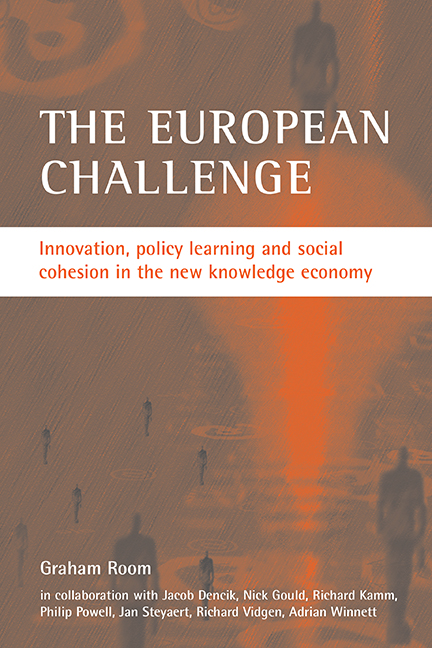Book contents
- Frontmatter
- Contents
- List of figures and tables
- Preface
- one The new knowledge-based economy
- two The EU response
- three Growth and stability
- four Dynamics and innovation
- five Enterprise and organisational change
- six Human investment and learning
- seven Social cohesion and inclusion
- eight Models and measurement
- nine Benchmarking and governance
- ten Globalisation and the knowledge economy
- Endnotes
- References
- Index
ten - Globalisation and the knowledge economy
Published online by Cambridge University Press: 18 January 2022
- Frontmatter
- Contents
- List of figures and tables
- Preface
- one The new knowledge-based economy
- two The EU response
- three Growth and stability
- four Dynamics and innovation
- five Enterprise and organisational change
- six Human investment and learning
- seven Social cohesion and inclusion
- eight Models and measurement
- nine Benchmarking and governance
- ten Globalisation and the knowledge economy
- Endnotes
- References
- Index
Summary
Introduction
As we saw in Chapter 1, when setting the context for this study, the development of the new knowledge-based economy is intimately bound up with the process of globalisation (see, for example, Soete, 1999; Togati, 2002). The ICT revolution enables enormously greater speed and accuracy of communication, transcending national boundaries and permitting greatly increased transparency of markets worldwide. These global markets then foster more intense competition, driving technological and organisational innovation and reshaping the global division of labour and welfare. They pose new challenges for the regulation of commerce and the protection of intellectual property rights.
Any attempt to conceptualise and measure the new economy must acknowledge this transformation of the international political economy. This does not mean that processes of globalisation are an outworking of the new economy alone. The challenge is to understand the specific ways in which the new economy and processes of globalisation are interrelated.
Globalisation can be defined as the organisation of economic, social or other activity in terms which transcend – and may even ignore – national boundaries (Dasgupta, 1998; Held et al, 1999; Torres, 2001). It raises questions of governance: how shall this activity be subjected to political scrutiny and direction if the nation state – traditionally the principal mode of governance – can no longer exercise control of this activity by reference to its own boundaries? It also raises questions of information: how can public policy makers provide themselves with the statistical information they require for evidence-based policy, when the instruments which they have inherited for this purpose are still organised principally by reference to national boundaries?
Globalisation is only one element in the reorganisation of space that has been under way in recent decades. For the countries of the EU, the effects of globalisation have to be set alongside those of Europeanisation, including monetary union and the Lisbon process, and the growing importance of the regions, at least in terms of governance. Nevertheless, the principal focus in this final chapter will be upon globalisation and the new economy, with these additional dimensions of spatial reorganisation being addressed only in so far as they are relevant to that discussion.
- Type
- Chapter
- Information
- The European ChallengeInnovation, Policy Learning and Social Cohesion in the New Knowledge Economy, pp. 151 - 162Publisher: Bristol University PressPrint publication year: 2005



